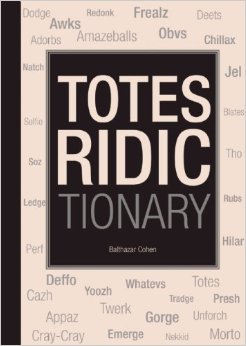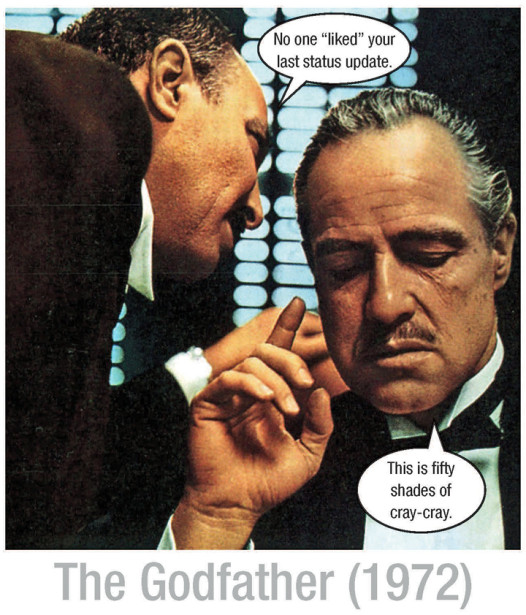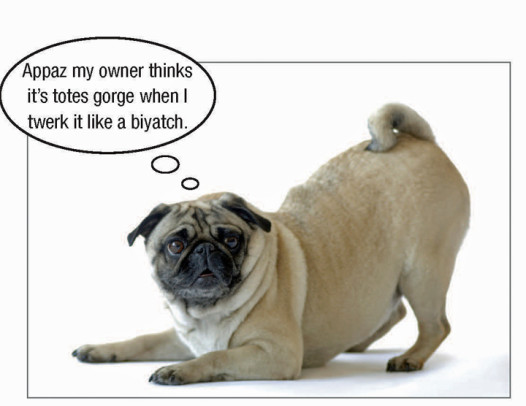 Ya know, convo once had legit vocab. *
Ya know, convo once had legit vocab. *
(*You know, conversation once had legitimate vocabulary.)
Forget Esperanto. The digital age has spawned a universal language measured in brevity and propagated globally. Def. (Definitely.)
When the latest headline about the leader of the free world (that would be Obama) outs him for taking a “selfie” at a state funeral, you know the speaking world has gone, well, cray.
Don’t get me wrong. I’m conversant with shorthand and techno-speak. As a journalist, I long ago perfected the art of rapid note-taking, my pages peppered with abbreviations (bldg, wkshp, conf, lger) that only I could translate.
My late father, who would have turned 86 on New Year’s Eve but was far ahead of his time, had a penchant for speaking in acronyms. A favorite and frequent exhortation: QYB! (Quit Your Bitching!)
When my kids hit their teens, I thought they had mastered the art of lingual insouciance, given their ability to invoke disdain with a single word: “Whatever.”
Now I get terse text messages equally cloaked in attitude. Whatev. Obvi. Chillax.

Movies re-imagined with cyberspeak, from ‘Totes Ridictionary’
No one is safe these days from this squeeze play on the English language. In the final play of Sunday’s Saints/Eagles game, I found myself texting my daughter: OMG OMG OMG.
Still, for someone born pre-World Wide Web (remembs?), the Twitter/texting lexicon, with its propensity for shortcuts and initials, offers plenty of pitfalls.
Redonk? Rando? ROFL? Really?
Apparently knowing this, Santa stuffed my stocking with Balthazar Cohen’s Totes Ridictionary, a tongue-in-cheek glossary and guide to the new rule of English 101: If you write it, abbreviate it.
As the author points out, with the advent of texting and Twitter, brevity has become the name of the game: “The dictionary went under technology’s knife and experienced dramatic weight loss – getting the bikini body it had always craved, but at what cost?”
You have to love a book with an introduction titled, “The Internet: Where Language Goes to Die.”
Equally magnif: One chapter that re-imagines movies and pop art with totes ridic dialogue, and another that envisions what might be said by history and literature’s most famous couples … on Twitter.
I fought the language-butchering trend early on. In the stone age of Internet, around the late ’90s, I reviewed a flashy new children’s website for the Times-Picayune newspaper, and lambasted the authors for cutesy spellings like kool and krazy. Why, I asked, would you intentionally misspell words on a site that, at least at some level, was about education? The authors protested. They were simply being hip, they said.
Duh.

If dogs could tweet, from ‘Totes Ridictionary’
But I am losing the war here. I long ago jettisoned any hope that contemporary language will remain intact. So, in efforts to keep up with what’s totes imports in online convo, I offer a few amazeballs words from the Ridictionary glossary, along with verbal color analyst Cohen’s take on them.
Even with Cohen’s guidebook, I’m not certain that I have mastered this new lexicon of twerks, deets and awks. If language is ultimately about communication, I sometimes fear that I am lost in cyberspace, doomed to wander forev in a weird and meaningless forest of skeletal words that leave me bewildered.
Whatev. I will totes survive.
 NOLAbeings Multimedia artist Claire Bangser created NOLAbeings as a portrait-based story project that marries...
NOLAbeings Multimedia artist Claire Bangser created NOLAbeings as a portrait-based story project that marries...  Voodoo in New Orleans: Reviving history: New Orleans fortune telling This article takes a deep dive into the history of Voodoo in New Orleans, its hybridization with Catholicism, and its present-day place in the city's culture. The author visits fortune-tellers in the French Quarter, using their guidance as a tool for introspection rather than a deterministic predictor of the future. Through her experiences in New Orleans, the author feels a mystical connection to both the past and the future.
Voodoo in New Orleans: Reviving history: New Orleans fortune telling This article takes a deep dive into the history of Voodoo in New Orleans, its hybridization with Catholicism, and its present-day place in the city's culture. The author visits fortune-tellers in the French Quarter, using their guidance as a tool for introspection rather than a deterministic predictor of the future. Through her experiences in New Orleans, the author feels a mystical connection to both the past and the future. 